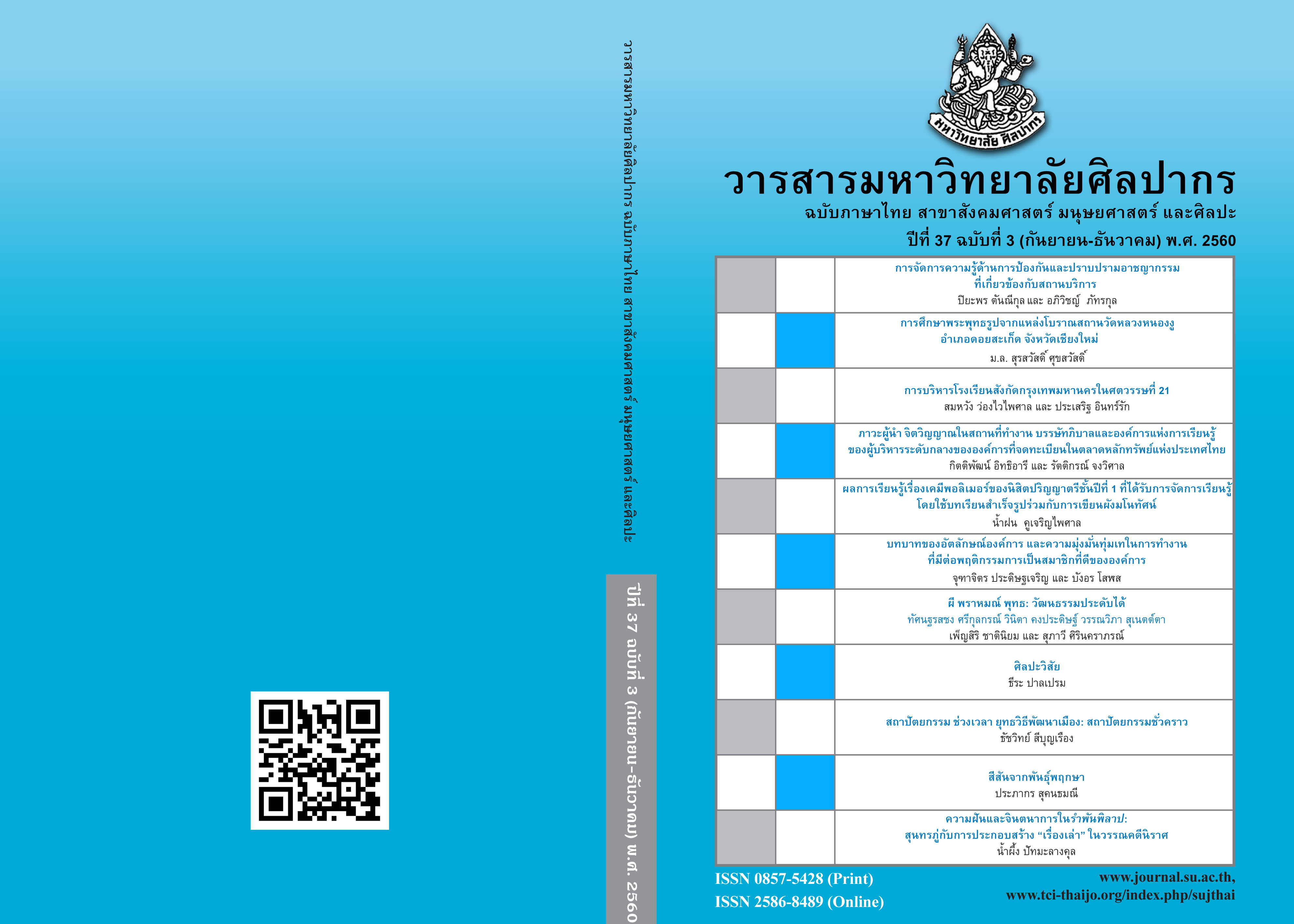ภาวะผู้นำจิตวิญญาณในสถานที่ทำงาน บรรษัทภิบาล และองค์การแห่งการเรียนรู้ของผู้บริหารระดับกลางขององค์การที่จดทะเบียนในตลาดหลักทรัพย์แห่งประเทศไทย (Leadership, Workplace Spirituality, Good Corporate Governance and Learning Organization of Middle Management of the Organization Listed on the Stock Exchange of Thailand)
Main Article Content
Abstract
วัตถุประสงค์ของการวิจัยครั้งนี้ เพื่อศึกษาระดับและความสัมพันธ์ระหว่างภาวะผู้นำ จิตวิญญาณในสถานที่ทำงาน บรรษัทภิบาล และองค์การแห่งการเรียนรู้ ตลอดจนศึกษาปัจจัยด้านภาวะผู้นำ จิตวิญญาณในสถานที่ทำงาน บรรษัทภิบาล ที่ร่วมกันพยากรณ์องค์การแห่งการเรียนรู้ โดยมีกลุ่มตัวอย่างคือ ผู้บริหารระดับกลางขององค์การที่จดทะเบียนในตลาดหลักทรัพย์แห่งประเทศไทย จำนวน 150 คน จาก 52 บริษัท เครื่องมือที่ใช้ในการเก็บรวบรวมคือแบบวัด สถิติที่ใช้ในการวิจัย ได้แก่ ค่าร้อยละ ค่าเฉลี่ย ส่วนเบี่ยงเบนมาตรฐาน ค่าสัมประสิทธิ์สหสัมพันธ์เพียร์สัน โปรดัก โมเมนต์ และการวิเคราะห์การถดถอยพหุคูณ
ผลการวิเคราะห์ข้อมูล พบว่า (1) ภาวะผู้นำอยู่ในระดับสูง จิตวิญญาณในสถานที่ทำงานอยู่ในระดับสูง บรรษัทภิบาลอยู่ในระดับสูง และองค์การแห่งการเรียนรู้อยู่ในระดับสูง (2) ภาวะผู้นำ จิตวิญญาณในสถานที่ทำงาน บรรษัทภิบาล มีความสัมพันธ์ทางบวกกับองค์การแห่งการเรียนรู้ อย่างมีนัยสำคัญทางสถิติที่ระดับ .01 (r = .489, .930 และ .725 ตามลำดับ) (3) จิตวิญญาณในสถานที่ทำงานสามารถพยากรณ์ความแปรปรวนในตัวแปรองค์การแห่งการเรียนรู้ได้ร้อยละ 86.3 อย่างมีนัยสำคัญทางสถิติที่ระดับ .01
The objectives of this research were to study the level and the relationships between leadership, workplace spirituality, good corporate governance and learning organization and to study the common predictors of learning organization from leadership, workplace spirituality and good corporate governance. The samples of this research were the middle-level management of the organizations listed on the Stock Exchange of Thailand, totaling 150 persons from 52 companies. The data collection method was questionnaires. The statistics used for data analysis were percentage, mean, standard deviation, Pearson’s product moment correlation and multiple regression analysis.
The research showed that 1) the levels of leadership, workplace spirituality, good corporate governance and learning organization were at a high level, 2) leadership, workplace spirituality and good corporate governance had a positive relationship with the learning organization at .01 level of significance. (r = .489, .930 and .725, respectively), and 3) workplace spirituality significantly predicts 86.3 percent of the variance in learning organization.
Downloads
Article Details
References
Chomsamnieng, S. (2016). Personal Factors, Leadership, Learning Organization and Work Engagement (ปัจจัยส่วนบุคคล ภาวะผู้นำ องค์การแห่งการเรียนรู้ และความยึดมั่นผูกพันในงาน). Master’s dissertation, Kasetsart University, Bangkok, Thailand.
Chongvisal, R. (2013). Leadership: Theories, Research, and Approaches to Development (ภาวะผู้นำ: ทฤษฎี การวิจัย และแนวทางสู่การพัฒนา). Bangkok: Chulalongkorn University Press.
Chongvisal, R. (2015). The Impact of Leadership, Workplace Spirituality and Spiritual Health (รายงานการวิจัยฉบับสมบูรณ์เรื่องอิทธิพลของภาวะผู้นำ จิตวิญญาณในสถานที่ทำงานและสุขภาวะทางจิตวิญญาณ). Department of Psychology, Faculty of Social Science, Kasetsart University.
DolatAbadi, H. R., & Nematizadeh, F. (2012). Analyzing the Impact of Corporate Governance and Organizational Learning on Strategic Planning Effectiveness (An Empirical Practice among some Industrial Companies in Iran). International Journal of Learning & Development, 2(3), 283-293.
Giacalone, R. A., & Jurkiewicz, C. L. (2003). Handbook of Workplace Spirituality and Organizational Performance. New York: M. E. Sharpe.
Hempromrach, S. (2008). The Relationships Between Self-development, Organizational Culture, and Learning Organization as Perceived by Professional Nurses at Phyathai 2 Hospital (ความสัมพันธ์ของการพัฒนาตนเอง วัฒนธรรมองค์การ กับการเป็นองค์การแห่งการเรียนรู้ตามการรับรู้ของพยาบาลวิชาชีพ โรงพยาบาลพญาไท 2). Master’s dissertation, Ramkhamhaeng University, Bangkok, Thailand.
Jones, G. R., & George, J. M. (2011). Contemporary Management: Global Edition. New York: McGraw-Hill/Irwin.
Kinicki, A., & Kreitner, R. (2008). Organizational Behavior: Key Concepts, Skills & Best Practices (3rd ed). United States of America: McGraw-Hill.
Krishnakumar, S., & Neck, C. P. (2002). The “What”, “Why” and “How” of Spirituality in the Workplace. Journal of Managerial Psychology, 17(3): 153-164.
Kuntonbutr, C. (2556). Principle of Management: Organization and Modern Management (หลักการจัดการ: องค์การและการจัดการสมัยใหม่). Bangkok: Chulalongkorn University Press.
Lussier, R. N. (2009). Management Fundamentals: Concepts, Applications, Skill Development. (4th ed). United States of America: South-Western Cengage Learning.
Mansell, M. (2008). The Learning Enterprise: Policy Governance and The Learning Organization. Doctor Of Education Dissertation In Educational Administration, Washington State University, Washington, United States of America.
Marquardt, M. J. (2002). Building the Learning Organization: Mastering The 5 Elements For Corporate Learning (2nd ed). California: Davies-Black.
Marsick, V. J., & Watkins, K. E. (2003). Demonstrating the Value of an Organization’s Learning Culture: The Dimensions of the Learning Organization Questionnaire. Advances in Developing Human Resources, 5(2), 132-151.
Metkarujit, M. (2554). Good Governance (การบริหารจัดการที่ดี). Nonthaburi: Book Point.
Mohamed, N. B., & Abdullah, A. B. (2012). The Company’s Spirituality Enhances Employees’ Ethical Behavior: Reality or Myths?. Retrieved on April 4, 2015, from https://www.researchgate.net/publication/282640893_The_Company's_Spirituality_Enhances_
Employees'_Ethical_Behaviour_Reality_or_Myths.
Pakdeejit, R. (2555). Good Governance, Public and Private Management (ธรรมาภิบาลเพื่อการบริหารภาครัฐและภาคเอกชน). Bangkok: Chulalongkorn University Press.
Robbins, S. P., & Judge, T. A. (2007). Organizational Behavior (12th ed). New Jersey: Pearson Education.
Sahaya, N. (2012). A Learning Organization As A Mediator Of Leadership Style And Firms’ Financial Performance. International Journal of Business and Management, 7(14), 96-113.
Saiklai, S. (2556). Leadership and the Learning Organization of the Hatyai City Municipality, Songkhla Provice. Academic Services Journal, 24(2), 43-60.
Schermerhorn, J. R., Uhl-Bien, M., Hunt, J. G., Osborn, R. N. (2010). Organizational Behavior (11th ed). United States of America: John Wiley & Sons.
Schiena, R. D., Letems, G., Aken, E. V., Farris, J. (2013). Relationship Between Leadership and Characteristics of Learning Organizations in Deployed Military Units: An Exploratory Study. Administrative Sciences, 3(September 2013), 143-165.
Senge, P. M. (1990). The Fifth Discipline: The Art and Practice of The Learning Organization. New York: Doubleday.
Slocum, J. W., Jackson, S. E., & Hellriegel, D. (2008). Competency-Based Management. China: Thomson South-Western.
Soonchan, T. (2012). Relationships between Organizational Culture in Era of Globalization Perceived by Health Personal and Performance according to Learning Organization Characteristics of Sub-district Health Promoting Hospital in Sakon Nakhon Province (ความสัมพันธ์ระหว่างวัฒนธรรมองค์การในยุคโลกาภิวัฒน์ตามการรับรู้ของเจ้าหน้าที่สาธารณสุขกับการปฏิบัติงานตามคุณลักษณะขององค์การแห่งการเรียนรู้ของโรงพยาบาลส่งเสริมสุขภาพตำบล จังหวัดสกลนคร). Master’s dissertation, Khon Kaen University, Khon Kaen, Thailand.
Sorenson, O., & Sorensen, J. B. (2001). Finding The Right Mix: Franchising, Organizational Learning, And Chain Performance. Strategic Management Journal, 22, 713-724.
Sudharatna, Y. (2009). Learning Organization (องค์การเพื่อการเรียนรู้). Bangkok: Chulalongkorn University Press.
The Stock Exchange of Thailand. (2012). The Principles of Good Corporate Governance for Listed Companies 2012 (หลักการกำกับดูแลกิจการที่ดีสำหรับบริษัทจดทะเบียน ปี 2555). Retrieved on February 15, 2015, from https://www.set.or.th/th/regulations/cg/files/2013/CGPrinciple2012Thai-Eng.pdf
Werner, J. M., & DeSimone, R. L. (2006). Human Resource Development (4th ed). Ohio: Thomson South-Western
Wood, J., Zeffane, R., Fromholtz, M., Wiesner, R., Creed, A. (2010). Organisational Behaviour: Core Concepts and Applications. Milton Qld: John Wiley & Sons Australia.
Worasunthararom, S. (2008). The Relationship between Leadership, Achievement Motivation, Organizational Culture and Learning Organization of Employees in The Siam Commercial Bank Public Company Limited (ความสัมพันธ์ระหว่างภาวะผู้นำ แรงจูงใจใฝ่สัมฤทธิ์ วัฒนธรรมองค์การ และองค์การแห่งการเรียนรู้ ของพนักงานธนาคารไทยพาณิชย์ จำกัด (มหาชน)). Master’s dissertation, Kasetsart University, Bangkok, Thailand.


